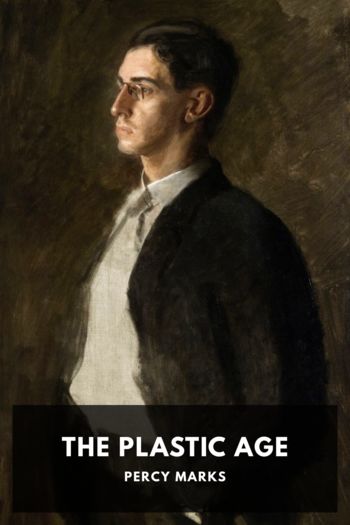The Plastic Age by Percy Marks (e book reader pc .TXT) 📕

- Author: Percy Marks
Book online «The Plastic Age by Percy Marks (e book reader pc .TXT) 📕». Author Percy Marks
Hugh felt that he ought to like all of his fraternity brothers, but, try as he would, he disliked the majority of them. Early in his sophomore year he knew that he ought to have “gone” Delta Sigma Delta, that that fraternity contained a group of men whom he liked and respected, most of them, at least. They weren’t prominent in student activities, but they were earnest lads as a whole, trying hard to get something out of college.
The Nu Delta meetings every Monday night were a revelation to him. The brothers were openly bored; they paid little or no attention to the business before them. The president was constantly calling for order and not getting it. During the rushing season in the second term, interest picked up. Freshmen were being discussed. Four questions were inevitably asked. Did the freshman have money? Was he an athlete? Had he gone to a prep school? What was his family like?
Hugh had been very much attracted by a lad named Parker. He was a charming youngster with a good mind and beautiful manners. In general, only bad manners were au fait at Sanford; so Parker was naturally conspicuous. Hugh proposed his name for membership to Nu Delta.
“He’s a harp,” said a brother scornfully. “At any rate, he’s a Catholic.”
That settled that. Only Protestants were eligible to Nu Delta at Sanford, although the fraternity had no national rule prohibiting members of other religions.
The snobbery of the fraternity cut Hugh deeply. He was a friendly lad who had never been taught prejudice. He even made friends with a Jewish youth and was severely censured by three fraternity brothers for that friendship. He was especially taken to task by Bob Tucker, the president.
“Look here, Hugh,” Tucker said sternly, “you’ve got to draw the line somewhere. I suppose Einstein is a good fellow and all that, but you’ve been running around with him a lot. You’ve even brought him here several times. Of course, you can have anybody in your room you want, but we don’t want any Jews around the house. I don’t see why you had to pick him up, anyway. There’s plenty of Christians in college.”
“He’s a first-class fellow,” Hugh replied stubbornly, “and I like him. I don’t see why we have to be so high-hat about Jews and Catholics. Most of the fraternities take in Catholics, and the Phi Thetas take in Jews; at least, they’ve got two. They bid Einstein, but he turned them down; his folks don’t want him to join a fraternity. And Chubby Elson told me that the Theta Kappas wanted him awfully, but they have a local rule against Jews.”
“That doesn’t make any difference,” Tucker said sharply. “We don’t want him around here. Because some of the fraternities are so damn broad-minded isn’t any reason that we ought to be. I don’t see that their broad-mindedness is getting them anything. We rate about ten times as much as the Phi Thetas or the Theta Kappas, and the reason we do is that we are so much more exclusive.”
Hugh wanted to mention the three Nu Delta thugs, but he wisely restrained himself. “All right,” he said stubbornly, “I won’t bring Einstein around here again, and I won’t bring Parker either. But I’ll see just as much of them as I want to. My friends are my friends, and if the fraternity doesn’t like them, it can leave them alone. I pledged loyalty to the fraternity, but I’ll be damned if I pledged my life to it.” He got up and started for the door, his blue eyes dark with anger. “I hate snobs,” he said viciously, and departed.
After rushing season was over, he rarely entered that fraternity house, chumming mostly with Carl, but finding friends in other fraternities or among non-fraternity men. He was depressed and gloomy, although his grades for the first term had been respectable. Nothing seemed very much worth while, not even making his letter on the track. He was gradually taking to cigarettes, and he had even had a nip or two out of a flask that Carl had brought to the room. He had read the Rubaiyat, and it made a great impression on him. He and Carl often discussed the poem, and more and more Hugh was beginning to believe in Omar’s philosophy. At least, he couldn’t answer the arguments presented in Fitzgerald’s beautiful quatrains. The poem both depressed and thrilled him. After reading it, he felt desperate—and ready for anything, convinced that the only wise course was to take the cash and let the credit go. He was much too young to hear the rumble of the distant drum. Sometimes he was sure that there wasn’t a drum, anyway.
He was particularly blue one afternoon when Carl rushed into the room and urged him to go to Hastings, a town five miles from Haydensville.
“Jim Pearson’s





Comments (0)